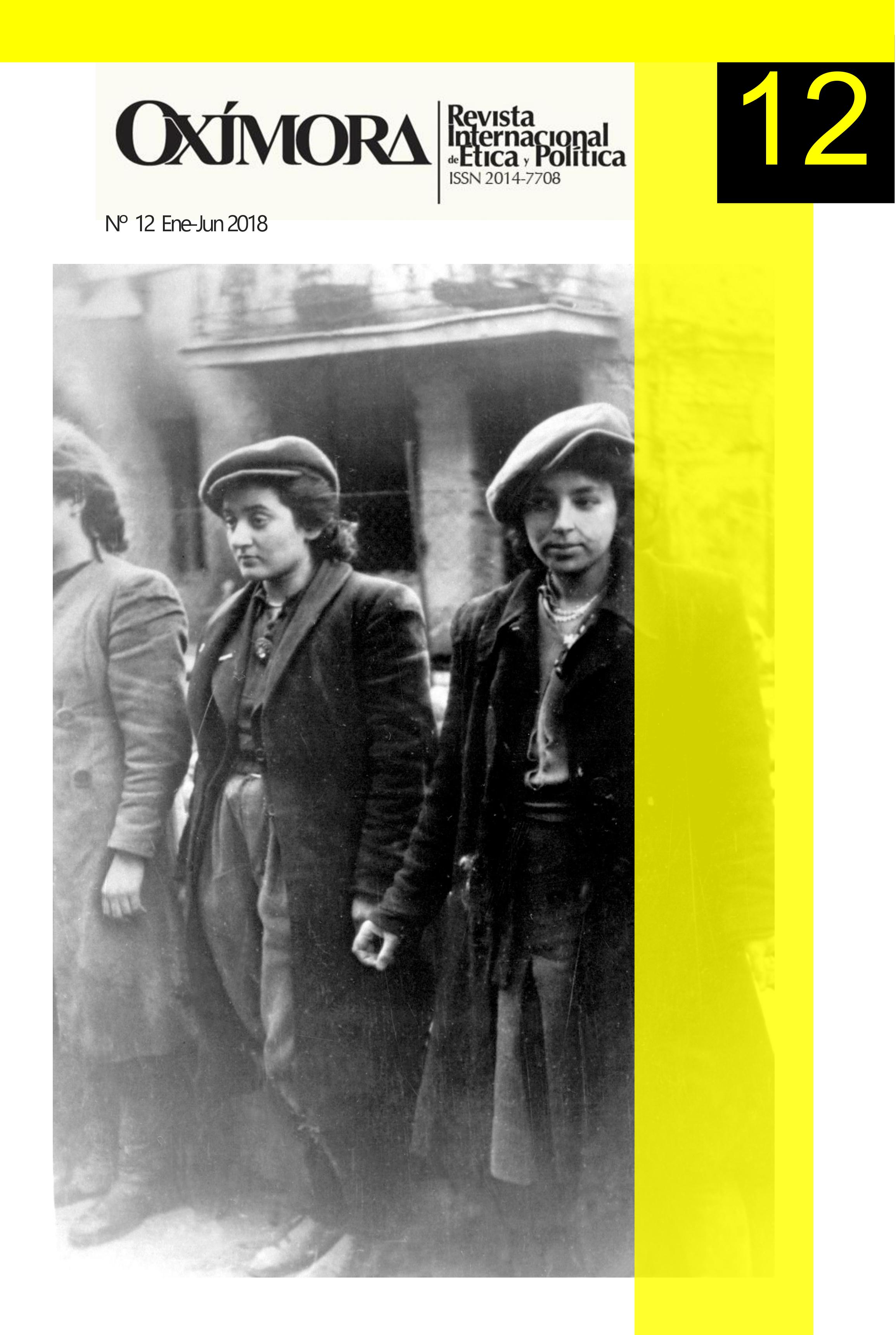Ontology and Resistance: The Constitution of Oneself as a Paradigm of Political Action in the Late Foucault
DOI:
https://doi.org/10.1344/oxi.2018.i12.20620Keywords:
Ontología-política, autonomía, inmanencia, uso, biopolíticaAbstract
When we think of Michel Foucault’s contribution to the history of contemporary political thought, we don’t usually refer to his investigations, conducted in the eighties, into the ethics of the care of oneself of Greco-Roman Antiquity. Does that research, nevertheless, lack any political meaning or consequence? To answer this question, we must first put forward the terms of what is mainly at stake in those investigations: the possibility to think differently what it means for a subject to be constituted. With them, Foucault seems to have found an experience and a practice of subjectivation that, once its ontological structure becomes clear, also allows us think of a concept of political action as immanent and autonomous subjectivation capable of resisting the modern dispositifs of power.
References
AGAMBEN, Giorgio. (2006). Che cos'è un dispositivo? Roma, Italia: Nottetempo.
AGAMBEN, Giorgio. (2014). L'uso dei corpi. Homo Sacer, IV, 2. Vicenza, Italia: Neri Pozza.
DELEUZE, Gilles. (2015). La subjetivación. Curso sobre Foucault, III. (P. A. Ires, & S. Puente, Trads.) Buenos Aires, Argentina: Cactus.
EPICURO. (2013). Obras (5a ed.). (M. Jufresa, Trad.) Madrid, España: Tecnos.
FOUCAULT, Michel. (1983). The Subject and Power. En H. Dreyfus, & P. Rabinow, Michel Foucault. Beyond Structuralism and Hermeneutics (2a ed., págs. 208-228). Chicago, Estados Unidos de América: The University of Chicago Press.
FOUCAULT, Michel. (2002). La hermenéutica del sujeto. Curso en el Collège de France (1981-1982) (2a ed.). (F. Gros, Ed., & H. Pons, Trad.) D.F., México: Fondo de Cultura Económica.
FOUCAULT, Michel. (2010). La inquietud de sí. Historia de la sexualidad, 3 (2a ed.). (T. Segovia, Trad.) D.F., México: Siglo XXI.
FOUCAULT, Michel. (2013). La arqueología del saber (2a ed.). (A. Garzón del Camino, Trad.) D.F., México: Siglo XXI.
FOUCAULT, Michel. (2013). Obras esenciales. (F. Álvarez-Uría, J. Várela, M. Morey, & Á. Gabilondo, Trads.) Barcelona, España: Paidós.
FOUCAULT, Michel. (2014). El uso de los placeres. Historia de la sexualidad, 2 (2a ed.). (M. Soler, Trad.) D.F., México: Siglo XXI.
GROS, Frédéric. (2002). Situación del curso. En M. Foucault, & F. Gros (Ed.), Hermenéutica del sujeto (H. Pons, Trad., 2a ed., págs. 479-516). D.F., México: Fondo de Cultura Económica.
LALLEMENT, Maxime. (2012). Foucault's Biopolitics: A Critique of Ontology. Journal of the British Society for Phenomenology, 43(1), 76-91. doi:10.1080/00071773.2012.11006758
PLATÓN. (1992). Diálogos, VII. Dudosos, apócrifos, cartas. (J. Zaragoza, & P. Gómez Cardó, Trads.) Madrid, España: Gredos.
SCHÜRMANN, Reiner. (1986). On Constituting Oneself an Anarchist Subject. PRAXIS International(3), 294-310. Obtenido de https://www.ceeol.com/search/article-detail?id=56191
SORRENTINO, Vincenzo. (2011). Dall'autogoverno all'autonomia: Foucault e la critica come êthos. En L. Bernini (Ed.), Michel Foucault, gli antichi e i moderni. Parrhesìa, Aufklärung, ontologia dell'attualità (págs. 129-155). Pisa: ETS.
Downloads
Published
How to Cite
Issue
Section
License
a) Authors retain copyright and grant the journal the right of first publication.
b) Texts will be published under a Creative Commons Attribution License that allows others to share the work, provided they include an acknowledgement of the work’s authorship, its initial publication in this journal and the terms of the license.



